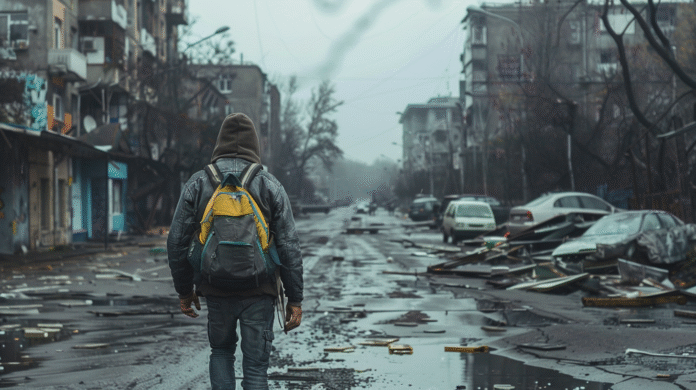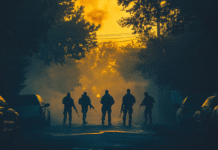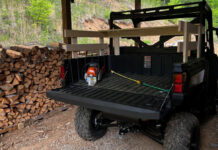On Monday, I watched the video posted at the bottom of this article from Andrew Bustamante because the channel often has interesting content, but what attracted me is its title, “Ultimate CIA Survival guide: Top Mistakes To Avoid.” I learned, however, that the former CIA spy’s approach to survival is different from prepping in the traditional “survivalist” sense that I practice and promote on this blog.
In the video, which I encourage you to watch, he says that it is more important to be mobile than it is to shelter in place. He states this is because when you shelter in place, you are relying on diminishing resources, whereas he recommends “carry the resources that you have and you can constantly collect new resources on the way.” He even says rather than relying on a limited amount of 9mm ammo on your shelf, you can forage new ammo from “a dead body or a killed cop” you come across while on the move.
I consider that an example of wishful thinking. For example, it assumes 1) whoever killed the cop didn’t take their gun and ammo, 2) the same threat that eliminated the cop won’t eliminate you while you loot the body, 3) you are the type of prepper who plans to survive by looting the dead (and maybe the weak and undefended), and 4) you don’t have a large quantity of ammo at home. For example, I have 3,000 rounds of 9mm ammo at home plus a few hundred more in caches. If we assume the average cop carries 50 rounds, I’d have to stumble across 80 cops or other dead people to “collect” that much ammo.
Good Preppers have Lots of Resources
His wishful thinking plan also fails to address food. Do we expect that dead will have food that has not been taken? Does he expect us to loot restaurants, businesses, or homes? Why would I want to live off only the food I can carry with me when I have shelves of canned food, buckets of dehydrated food, and fresh eggs that pop out of a chicken daily? The only reason to bug out is if my life is endangered by staying home, which might be the case in a huge wildfire.
I am also amused that he thinks preppers can “carry the resources we have” while mobile. That’s great if your primary prep is a bugout bag or a military rucksack, but I know many preppers who would need to rent a U-Haul or Ryder box truck to move all their preps. It took me multiple trips with a loaded pickup truck and trailer to move ours, and I know families who are better prepared.
Staying Mobile
Andrew says the CIA teaches mobility, which “is huge, when it comes to actual survivability.” If you are a CIA agent operating without diplomatic immunity in a foreign country, it makes perfect sense to want to escape rather than hiding out if the secret police want to question you. I expect this is why the CIA teaches mobility, because you can run away and fight another day. If someone is out to get you, it makes more sense to be a moving target rather than a static one.
But in his scenario, there is what he calls “a safe haven,” somewhere safe to go. It also assumes you have the funds and means to get there, whether that is boarding a flight, crossing the border in a car, or hightailing it to the closest American embassy.
His perspective, based on his experience as a covert agent, fails to address what happens if there are no flights, if there are roadblocks on the highways, and there is nowhere safe to go. After 9/11, for example, flights were grounded for two days; it can happen again. Any large-scale grid-down scenario is going to knock local airports off line and make car travel more difficult, especially when you need to refill your tank and the pumps are down.
Andrew gives an example of “getting on a plane in Tampa, get off in Harrisburg, Pa., and you stay at a hotel.” This kind of emergency vacation is fine if there is a minor incident in your home and you just want to get out of there until it is resolved, but very few airline seats will be available when a hurricane is heading to Tampa. Likewise, earthquakes and other disasters can damage bridges, roads and elevated roadways, restricting mobility.
Our Experience
When Helene hit, our vehicles were trapped on the mountain because the road, ford and bridge were all washed out. The firemen who hiked up to check on us offered to take us to the local high school where there was hot food. Since we had hot food at home, this was not much of an inducement. We declined, even when they told us it could be three months before we had power again. We knew we had sufficient food and other resources.
In the end, most of the people they evacuated were the elderly and those who needed medical attention. Even people whose houses were damaged or destroyed stayed in the area, often moving in with friends or relatives. Relief efforts came to them.
We have friends in their 80s who had several feet of water in the basement. They bugged out to a hotel a few hours away, which they used as a base to make phone calls, get online, and touch bases with their kids across the country. After two days, they came home to start cleaning up and making repairs.
The people who were luckiest were those who were out of town when disaster hit. We have friends who were in Wyoming on vacation when Helene hit. They extended their vacation for an extra week. As a result, they had to clean out a smelly refrigerator when they got home, but they lived without power for less than 36 hours before it went back on. They avoided much of the trauma caused by the storm. This is the key: avoid the disaster, either by luck or by planning. That means bugging out early.
A Different Kind of Mobility
If you live in an urban environment and you have somewhere to go—somewhere they expect you and will welcome you—then bugging out may be the best choice. In our case, we are the retreat to which others will bugout. We could have 8 to 10 people show up, which means our resources will diminish much faster than they would for just the two of us.
We have some resources that will replenish themselves seasonally or, in the case of chicken eggs, daily. However, while honey, eggs, berries, apples, garden produce, venison, wild turkey, and other game will help stretch our resources, they are not sufficient to replace our stored food. We have to hope for a recovery. The more people who arrive, the sooner we will need recovery or rescue. With Helene, food relief flowed quickly; in a nationwide disaster, we can’t count on that.
I think the best answer in that scenario would be to combine some mobility with bugging in. We stay home with our rather than evacuating, but we are mobile in our immediate area of operations, which may be a radius of several miles. In a SHTF scenario without the rule of law (WROL) where it is every man for himself, we will have to run patrols and man shooting positions overlooking roadblocks. I can see intelligence value in this kind of mobility and maintaining contact with others in the area, but I see no reason to bug out well before our resources are used up. Better to bug out then, or to expand our area of operations and look for new resources.
Don’t Wait for a Tipping Point
Andrew’s points about when to bug out are more on target. It is always better to bug out well before an event, while those airplane seats are still available and the highway is open.
Let’s apply his three step approach to an incoming hurricane heading towards Tampa, where a married couple with two kids lives in a house that has been damaged by hurricanes before. They check in with each other six days out, when the storm first makes the news and the track is heading toward Tampa. They decide to put some plans into action and reassess four days from landfall. Two days before landfall, they will make a final decision whether to bug out or stay home.
That approach gives them time to make preliminary preps, like filling the car’s gas tank, packing their bags, gathering important papers, alerting their bug out location (if family or friends) to the possibility that they might bug out there, or make hotel reservations. They can also test their generator to be sure it starts, fill up the spare gas cans, buy bottled water and batteries, install the hurricane shutters, etc.
Four days out, the parents touch bases with each other, report what steps they have taken, and evaluate the latest forecasts. Is the storm still heading towards Tampa? Is it getting stronger or weaker? They agree that if it is predicted to come ashore as a category 1 or 2 storm, they are staying, but if it is a category 3 or greater, they are bugging out.
Two days before the storm hits, they consider the available news and make their decision and either stay home or bug out. That should be an early enough start that the interstates will be busy, but the gas station will still have gas.
No Notice or Warning
For many emergencies, such as an earthquake, there is no warning. For a tsunami, you may have only minutes in which to get to higher ground. With a solar flare, you might have a day’s warning. If we are attacked with nuclear weapons or an EMP, it will be a surprise. A terrorist attack, a bombing, or a hack on the grid will also be unannounced. In these cases, you will have make a quick decision and determine if you are better off bugging in or bugging out. Key criteria for your decision making are:
- Do you have somewhere else to go that is unaffected, or where it will be safer and/or you will be better off?
- How long do you expect the event to last? Do you have enough supplies to last at least twice that long?
- How widespread is the disaster? Local, regional, or national? Can you travel out of the affected area?
- If you do not bug out now, will there be opportunities to do so in the future?
- Do you feel safe in your current location, or is there a continuing threat?
- Is your preferred method of evacuation and route of departure available? (No roadblocks, martial law, damaged infrastructure, etc.)
- What are the risks of bugging out versus those of bugging in?
The novel Patriots by James Wesley Rawles illustrates the disadvantages of bugging out too late. It may be slightly out of date, but the story line is still educational. In the chapter Mare’s Shank, it tells the story of a character who utilizes Andrew’s “stay mobile” approach. Spoiler alert: That character bugged in when given the chance to do so.
Your Choice
Just as I don’t agree with Andrew Bustamante approach, you don’t have to agree with mine. Take what you see on YouTube and the internet with a grain of salt, use common sense, and make sure your choices fit your scenario, not my scenario or his. But do yourself a favor and have a plan. Plan how to decide whether you will stay or go, and under what circumstances. Plan what you will do if you bug in. If you bug out, know where you are going, alternate routes to get there, and what you will bring.
Two recent posts on bugging out cover planning and bugout meals.
Video of the Day
The content related to bugging in versus being mobile starts immediately and lasts about 6.5 minutes.







